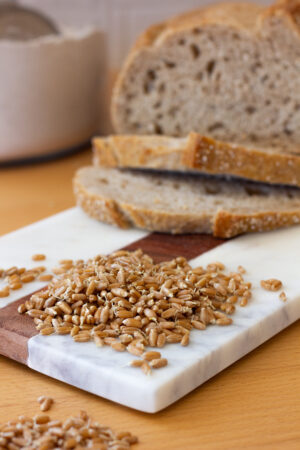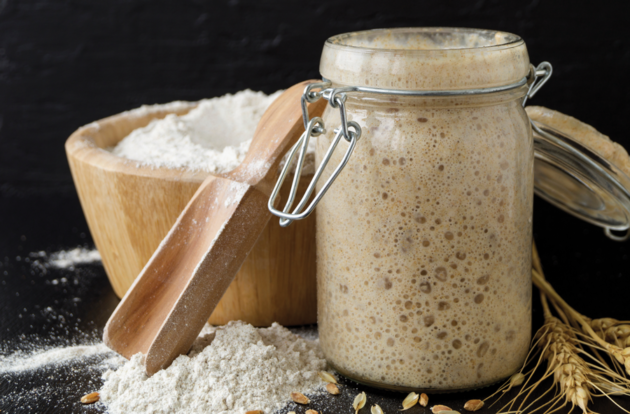
Baking for a healthy gut
By Jane Dummer
Food Trends Bake & Snack Food Health & Wellness Bakery processing Editor pick functional foodsFibres, pre- and pro-biotics, and some processing techniques are making baked goods gut friendly
 Sprouted whole grain baked goods offer consumers a healthy dose of fibre. Photo © Everspring Farms
Sprouted whole grain baked goods offer consumers a healthy dose of fibre. Photo © Everspring Farms Consumers’ desire for healthier eating is evolving. Gut health is on-trend, specifically since the pandemic revealed the importance of proactive nutrition. Research shows a healthy gut goes beyond the digestive tract to influence overall immune health, mental health, and skin health. The growing consumer trend for healthier food products and increased awareness of gut health is leading companies to innovate to meet this demand, especially in the baking industry. Bread, baked goods, and bakery mixes are all excellent applications to include more gut-friendly ingredients. There are several ingredients available to make bakery products more gut-friendly including fibres, prebiotics, and probiotics, plus processing techniques like sprouting and fermenting.
Fibres
Soluble and insoluble dietary fibres are an important gut health nutrient. Fibre is vital for gut transit time, as well as maintaining a healthy gut microbiome. The challenge of adding high amounts of fibre can have a negative impact on the product’s structure and sensory properties. A technique to combat this challenge is through sprouting. Dianne Wolters, vice-president, product development, Everspring Farms, explains, “Baked goods made with sprouted grains and flours benefit from all the wholesome nutrition of whole grains as well as improved nutrient bioavailability and soluble fibre content due to the germination process. Sprouted grains are particularly beneficial for gut health because the sprouting process produces enzymes which unlock nutrient inhibitors, present in all whole grains, converting them into a more digestible form. In addition, sprouting has been shown to convert a proportion of the insoluble fibre in whole grains to soluble fibre which feed gut friendly bacteria in our digestive systems. But perhaps the most important consideration is making sure consumers enjoy the taste of gut friendly foods. The sweeter taste and more tender crumb in bakery items made with sprouted flours make them ideally suited to a wide variety of product applications from sweet goods to breads.”

Fermented foods like sourdough bread are known to promote gut health. Photo © Julia Sedaeva / Adobe Stock
Prebiotics
Continuing with the fibre category, prebiotics have gained traction as ingredients in the baking sector over the past decade. Prebiotic compounds provide nutrients for healthy gut bacteria to maintain a beneficial, diverse microbiome. Kara Landau, RD, a dietitian at Gut Feeling Consultancy and media representative for Global Prebiotic Association, describes, “With rising consumer awareness of the benefits of gut health, and the continued association that people make between prebiotics and fibre, baked goods that are already promoting their higher fibre content. Savoury options like breads or wraps make an ideal category to enhance gut healthy prebiotic benefits. There are select prebiotics that are also classified as fibres. These prebiotics are stable throughout food processing environments. Examples include high maize and resistant dextrins. This gives the opportunity to strategically enhance a baked good and turn it into a functional food offering to consumers.”
The growing body of research in gut health is not only good news for the baking industry, but also for the farmers growing the crops that support it. It’s evident there are many new products in bakery that incorporate novel ingredients beneficial to the microbiome. Wolters agrees, “The increasing consumer awareness about gut health is a wonderful opportunity to incorporate a wider variety of whole grains and other exciting new ingredients into baked goods. This has ripple effects throughout the entire supply chain and incentivizes farmers to add a wider variety of grains and seeds to their crop rotations, many of which have excellent benefits for soil health and sustainability.”
Probiotics
Up next are gut-friendly probiotics. The first and obvious food category for consumers to incorporate probiotics into their diet was dairy. The baking industry recognized a challenge because the probiotic strains needed had to survive the baking process. Landau says, “When it comes to gut health baking opportunities, it is imperative that companies and product developers work with experts who understand which prebiotics and probiotics will withstand various heating and processing conditions to retain their true functionality. This is necessary to ensure consumers can trust the integrity of the products being released. Selecting the best prebiotic and/or probiotic to incorporate into a baked good needs to be determined based on various aspects related to both the brand positioning and the manufacturing capabilities for the company.”
Fermented foods have long been associated with gut health. From sauerkraut to sourdough bread, the digestive health benefits from the lactic acid bacteria production (Lactobacillus and Bifidobacterium in particular) can assist in maintaining a healthy gut microbiome and support the immune system. In addition to the health benefits, research from Puratos shows sourdough and the enzymes associated with sourdough fermentation can be used as solutions to improve the structural profile of high-fibre breads. Here too, health, taste and texture are important. Puratos is working on enzyme and sourdough-based innovations to bring more dietary fibres to bread to support digestive health.
Finally on the gut-friendly ingredient side, postbiotics are a new category of functional ingredients. Postbiotics are emerging as a category because of their gut health benefits, plus their functional attributes such as withstanding high heat processing conditions in baking. The category includes a variety of compounds like enzymes, peptides, and fatty acids. This is a promising area of research and product development for gut health, therefore, keep it on your radar.
People are interested in purchasing food that supports and improves gut health. This represents a huge opportunity for bakers. Wolters is incredibly positive about the current and future opportunities in this space and concludes, “The research that is developing about the importance of gut health to overall health and well-being is exciting. We’re only starting to scratch the surface in our understanding of the complexities that exist within our digestive systems. Therefore, people are making connections between how the health of their gut microbiome could be impacting their overall health in ways they never could have imagined. As a result, the products available in the baking category that incorporate ingredients beneficial to our microbiome are easily giving consumers the option to include gut-friendly, wholesome ingredients into their diets.”
An edited version of this column was initially published in the June/July 2023 issue of Food in Canada.
Print this page